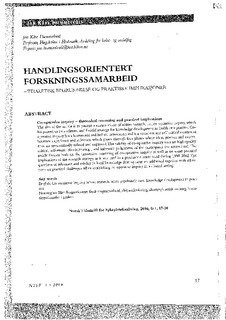Handlingsorientert forskningssamarbeid - teoretisk begrunnelse og praktiske implikasjoner
Peer reviewed, Journal article
Permanent lenke
http://hdl.handle.net/11250/134228Utgivelsesdato
2006Metadata
Vis full innførselSamlinger
Originalversjon
Norsk tidsskrift for sykepleieforskning 8 (2006), nr. 1, s. 17-30Sammendrag
Co-operative inquiry ? theoretical reasonning and practical implications The aim of this article is to present a certain mode of action research, i.e., co-operative inquiry, which has proved to be a relevant and fruitful strategy for knowledge development in health care practice. Co-operative inquiry has a humanistic and holistic orientation and is a conscious and self-critical movement between experience and reflection which passes through four phases where ideas, practice and experience are systematically refined and improved. The validity of co-operative inquiry rests on high-quality, critical, self-aware, discriminating , and informed judgement of the participants (co-researchers). The article focuses both on the theoretical reasonning of co-operative inquiry as well as on some practical implications of the research strategy as it was used in a psychiatric acute ward during 1998-2002 (i.e., Project Teaching Ward). The questions of relevance and validity in local knowledge development are addressed together with reflections on practical challenges when establishing co-operative inquiry a clinical setting. Key words: Co-operative inquiry, action research, acute psychiatric care, knowledge development in practice
